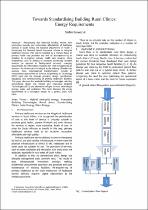JavaScript is disabled for your browser. Some features of this site may not work without it.
- ResearchSpace
- →
- Archives collection
- →
- Other Materials
- →
- View Item
| dc.contributor.author |
Szewczuk, S

|
|
| dc.date.accessioned | 2015-08-19T11:08:17Z | |
| dc.date.available | 2015-08-19T11:08:17Z | |
| dc.date.issued | 2015-03 | |
| dc.identifier.citation | Szewczuk, S. 2015. Towards standardising building rural clinics: energy requirements. In: 2015 International Conference on the Domestic Use of Energy, Cape Town, South Africa, 31 March- 1 April 2015, pp 131-136 | en_US |
| dc.identifier.uri | http://hdl.handle.net/10204/8084 | |
| dc.description | 2015 International Conference on the Domestic Use of Energy, Cape Town, South Africa, 31 March-1 April 2015. | en_US |
| dc.description.abstract | Recognising that historical funding models have entrenched inequity and undermined affordability of healthcare services in South Africa, the National Department of Health is introducing the National Health Insurance scheme to integrate healthcare services. This will be heralded by a renewed focus on primary health care provision and will be accompanied by an initiative to re-engineer primary health care services. Major implications, such as shifting to increased community outreach services (as opposed to facility-based services); emerging requirements for information networks (for NHI management) are foreseen. As infrastructure is integral to the delivery of health care services, these organisational transformations provide an extraordinary opportunity for Science, Engineering & Technology (SET) input into the strategic planning, design, specification, equipping, and commissioning of primary healthcare facilities. This paper discusses the available building technologies including conventional (brick and mortar) and Innovative Building Technologies (IBTs) and alternative off-grid services technologies (energy, water, and sanitation). The paper discusses the energy requirements of a conceptual design for a generic, basic rural clinic. | en_US |
| dc.language.iso | en | en_US |
| dc.relation.ispartofseries | Worklist;15212 | |
| dc.subject | South African health services | en_US |
| dc.subject | Integrated health services | en_US |
| dc.subject | Innovative building technologies | en_US |
| dc.subject | Rural clinics | en_US |
| dc.subject | Hybrid mini-grid energy | en_US |
| dc.subject | Standardising clinics | en_US |
| dc.subject | Solar energy | en_US |
| dc.subject | Wind energy | en_US |
| dc.title | Towards standardising building rural clinics: energy requirements | en_US |
| dc.type | Other Material | en_US |
| dc.identifier.apacitation | Szewczuk, S. 2015. <i>Towards standardising building rural clinics: energy requirements.</i> http://hdl.handle.net/10204/8084 | en_ZA |
| dc.identifier.chicagocitation | Szewczuk, S. 2015. <i>Towards standardising building rural clinics: energy requirements.</i> http://hdl.handle.net/10204/8084 | en_ZA |
| dc.identifier.vancouvercitation | Szewczuk S. 2015. <i>Towards standardising building rural clinics: energy requirements.</i> http://hdl.handle.net/10204/8084 | en_ZA |
| dc.identifier.ris | TY - Other Material AU - Szewczuk, S AB - Recognising that historical funding models have entrenched inequity and undermined affordability of healthcare services in South Africa, the National Department of Health is introducing the National Health Insurance scheme to integrate healthcare services. This will be heralded by a renewed focus on primary health care provision and will be accompanied by an initiative to re-engineer primary health care services. Major implications, such as shifting to increased community outreach services (as opposed to facility-based services); emerging requirements for information networks (for NHI management) are foreseen. As infrastructure is integral to the delivery of health care services, these organisational transformations provide an extraordinary opportunity for Science, Engineering & Technology (SET) input into the strategic planning, design, specification, equipping, and commissioning of primary healthcare facilities. This paper discusses the available building technologies including conventional (brick and mortar) and Innovative Building Technologies (IBTs) and alternative off-grid services technologies (energy, water, and sanitation). The paper discusses the energy requirements of a conceptual design for a generic, basic rural clinic. DA - 2015-03 DB - ResearchSpace DP - CSIR KW - South African health services KW - Integrated health services KW - Innovative building technologies KW - Rural clinics KW - Hybrid mini-grid energy KW - Standardising clinics KW - Solar energy KW - Wind energy LK - https://researchspace.csir.co.za PY - 2015 T1 - Towards standardising building rural clinics: energy requirements TI - Towards standardising building rural clinics: energy requirements UR - http://hdl.handle.net/10204/8084 ER - | en_ZA |






